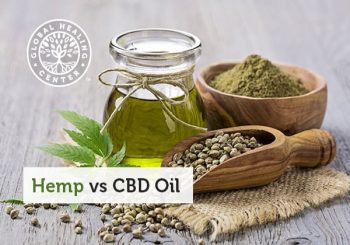Guest Writer for Wake Up World
Originally published at Global Healing Center and reproduced here with permission.
Are you wondering about the differences between hemp and CBD oil? How do hemp and marijuana differ? With so many new hemp products on the market, conscientious consumers want to pick the best supplements made with the highest-quality processes and ingredients. If you want to learn how to distinguish between all the terms and products — or just see what all the excitement is about — read on.
[pro_ad_display_adzone id=”110028″]
People have used hemp (Cannabis sativa) since ancient times for its incredible health benefits. This diverse plant has thousands of uses and people used it — legally — for centuries. Early Americans grew the fast-growing plant for textiles and rope due to its stronger-than-steel stalk. But in 1970, due to political pressure, the Controlled Substances Act outlawed both hemp and marijuana in the United States. Companies still sold hemp products after then — you might have seen hemp shirts or jewelry or hemp seed hearts — but they came from imported sources.
With the passing of the 2018 Farm Bill (Agricultural Improvement Act), farmers can once again grow hemp in the U.S.
Companies can also sell hemp throughout the country.[1] As a result, you suddenly see thousands of hemp products like CBD or hemp extract on the market — and with them, a lot of possible confusion.
Let’s break it down.
The Beneficial Compounds in Cannabis
Hemp and marijuana are different forms of Cannabis. While all hemp comes from Cannabis sativa and contains low levels of THC, marijuana is bred for high THC and can be Cannabis sativa or C. indica. THC is the compound responsible for the psychoactive effects that people experience. Farmers breed hemp to have low THC content. In fact, the law classifies hemp as any Cannabis sativa containing 0.3 percent or less THC.[1]
The hemp plant contains many natural chemical compounds, including the phytocannabinoids it’s famous for. These natural substances stimulate the body’s endocannabinoid system, which keeps the body in balance (physiological homeostasis).
THC — Tetrahydrocannabinol
Most people have heard of THC because of the “high” it produces when used recreationally. Marijuana plants contain around 10 percent THC or even greater, compared to the much lower 0.3 percent or below for hemp. While some states regulate non-hemp Cannabis products, it is not federally legal to sell in the U.S.
If a hemp plant or hemp-derived product contains greater than 0.3 percent THC, it would also not be federally legal. On the other hand, full-spectrum hemp products that do contain up to 0.3 percent THC can now legally be sold nationwide. They can also be shipped in the postal mail, used in most public places, and taken on airplanes across state lines (be careful with international travel as other countries have different laws).
Some hemp products contain no THC. These products are considered broad-spectrum — as compared with full-spectrum (see below). Full-spectrum products are recommended because THC in itself is one of hemp’s beneficial compounds, with analgesic effects that ease physical discomfort as well as relieve daily stress and anxiety.[2]
CBD — Cannabidiol
The benefits of CBD are impressive! It is most known for its ability to bring relaxation and calm, ease joint discomfort, support a healthy inflammatory response.
On top of that, while CBD promotes an alert calm during daytime, it promotes restful sleep at night.
Growers often breed the hemp plant for a high CBD (cannabidiol) concentration, besides having low THC. Hemp-derived CBD with less than 0.3 percent THC is now widely sold.
You can also buy non-hemp CBD derived from marijuana, but it’s only legal in states with medical marijuana laws and is not federally legalized in any state, so you should not mail it, use it in public, or take it on airplanes. Hemp-derived CBD is perfectly fine in these places.
Other Cannabinoids and Nutritious Compounds
While CBD and THC are best known, Cannabis contains trace amounts of a wide variety of other cannabinoids. These include CBG (cannabigerol), CBC (cannabichromene), and CBN (cannabinol). Scientists are exploring the health benefits of hemp’s minor constituents, and the research results show promise.[3, 4, 5]
Hemp contains protein, chlorophyll, fiber, plus many vitamins, fatty acids, flavonoids, antioxidants, terpenes, and a wide variety of synergistic metabolites. In a full-spectrum product, all the plant compounds work together, creating a stronger effect on the body than each would alone. This is known as the “entourage effect.”
For more information, check out our article on the top five health benefits of hemp.
Types of CBD Products
As you may have noticed, CBD and hemp products are in high demand! You can find many product variations, ranging from liquid extracts or oils, gummies, and vaping options. These products vary greatly in concentration, quality, and how they’re absorbed in the body.
Full-Spectrum Hemp
A full-spectrum hemp extract or oil contains all the plant compounds found in the Cannabis plant for maximum health benefit.[2] Full-spectrum products are typically made with all parts of the plant — flowers, stalks, leaves, seeds, and roots.
A high-quality, full-spectrum product tends to be more expensive because it’s made using an artisanal approach, like a fine wine or craft beer. All the naturally-occurring substances work together, creating enhanced health benefits — the entourage effect. A full-spectrum product is recommended so that you get the full range of health benefits from this therapeutic plant.
Full-spectrum hemp extracts are created using a highly advanced process. The hemp plant gets macerated using state-of-the-art equipment, then soaked in liquid for several days. The extraction process results in a highly concentrated product.
Broad-Spectrum Hemp
A broad-spectrum product, in contrast to full-spectrum, has some components removed — usually THC.
Broad-spectrum offers a distant second-best option because you lose some of the health benefits as well as the entourage effect. It can be a good option for people who may be sensitive to even very low levels of THC or want to avoid it for other reasons.
CBD Isolates
CBD is not the same as hemp oil. CBD isolates are simply cannabidiol in its purest form, typically as a white crystal powder or waxy resin. They can be synthetic (not recommended) or non-synthetic — isolated and purified from the plant through laboratory processes.
You can also buy CBD oil, which is CBD extracted into an oil base.
While CBD alone offers incredible health benefits, a pure CBD product is the least recommended option for a couple of reasons. First, CBD oil contains a single chemical compound, whereas full-spectrum hemp oils or extracts contain all of the plant’s vitamins, nutrients, and cannabinoids. Second, you can easily end up with a synthetic product. Finally, isolates can create tolerance, where you need more and more to achieve the same effect.
Full-Spectrum Hemp Extract Shopping Guide
Many brands are capitalizing on the Cannabis craze. You can now find hundreds of products — how do you know which you want? Something sold as “hemp oil” can be any number of products, ranging from something from just hempseed oil to a full-spectrum product. While cold-pressed hempseed oil makes a delicious addition to a salad dressing and does wonders for your skincare regimen, it’s not the product that most people are looking for these days — something that contains CBD and other helpful cannabinoids.
Instead, seek out a pure, high-quality product: certified organic, free of harmful additives and fillers, whole-plant, full-spectrum, and grown from American hemp. Products made with imported hemp do not go through the rigorous quality-control process that American-made, organic products do. Imported hemp can contain impurities or even toxins. Also, make sure to buy from an established supplement company experienced in sourcing, processing, and testing for quality ingredients.
Global Healing Center’s full-spectrum, high-potency Organic Hemp Extract is a product you can trust. We use American-grown hemp and test each batch for purity and safety, so you can enjoy the remarkable benefits of this miracle plant just like nature intended. Our cold process extraction reduces the loss of volatile yet important phytochemicals and ensures you get the best, most potent product on the market.
Points to Remember
Full-spectrum hemp extract, CBD, hempseed (or hemp seed) oil, and hemp oil are different things. It pays to know the difference when it comes to your overall health and well-being — and to get your money’s worth. CBD or cannabidiol is a unique phytocannabinoid found in Cannabis that offers many health benefits. In contrast, a full-spectrum product captures all the plant compounds, including CBD plus CBG, CBC, THC, and other beneficial compounds.
Full-spectrum means that the products contain all of hemp’s naturally-occurring cannabinoids and other nutrients. This means you get the ultimate in relaxation, deep sleep, easing of joint discomfort, and other health benefits. Be careful if you are searching for “hemp oil” because you may end up with pure hempseed oil instead — while it’s great for culinary uses, it does not contain a full-spectrum of cannabinoids.
High-quality full-spectrum hemp extracts are typically made using a connoisseur’s approach. This means that manufacturers use all of the plant parts, including flowers, leaves, roots, seeds, and stems, so they capture all the nutritious and beneficial chemical compounds. A quality product like Global Healing Center’s cold-processed certified Organic Hemp Extract will ensure you get all the health benefits that hemp can offer.
Have you tried hemp or CBD? What was your experience? Share in the comments below!
Article sources:
- The Farm Bill, Hemp Legalization and the Status of CBD: An Explainer. The Brookings Institute. Published 14 Dec 2018. Accessed 28 Jun 2019.
- Hill KP, et al. Cannabis and pain: a clinical review. Cannabis Cannabinoid Res. 2017;2(1):96–104.
- Prenderville JA, et al. The role of cannabinoids in adult neurogenesis. Br J Pharmacol. 2015 Aug; 172(16):3950–3963.
- Williamson EM, Evans FJ. Cannabinoids in clinical practice. Drugs. 2000 Dec;60(6):1303-1314.
- Andre CM, et al. Cannabis sativa: the plant of the thousand and one molecules. Front Plant Sci. 2016;7:19.
Recommended articles by Dr. Edward Group:
- Vaginal pH Balance: Natural Ways to Stay Balanced and Healthy
- CoQ10 Benefits: A Powerful Energizing Antioxidant for Health and Vitality
- How to Increase Testosterone: Natural Hacks That Work
- 9 Natural Remedies for Headaches for Quick Relief
- The Healing Power of a Gut Cleanse: 6-Day Detox
- Hormonal Imbalance in Women: Top Causes and Home Remedies
- The Link Between B-12, Brain Function and Memory
- The Top 10 Detox Herbs
- 14 Foods that Cleanse the Liver
- Top 5 Foods for the Pineal Gland
About the author:
Dr. Edward F. Group III (DC, ND, DACBN, DCBCN, DABFM) founded Global Healing Center in 1998 with the goal of providing the highest quality natural health information and products. He is world-renowned for his research on the root cause of disease. Under his leadership, Global Healing Center earned recognition as one of the largest natural and organic health resources in the world. Dr. Group is a veteran of the United States Army and has attended both Harvard and MIT business schools. He is a best-selling author and a frequent guest on radio and television programs, documentary films, and in major publications.
Dr. Group centers his philosophy around the understanding that the root cause of disease stems from the accumulation of toxins in the body and is exacerbated by daily exposure to a toxic living environment. He believes it is his personal mission to teach and promote philosophies that produce good health, a clean environment, and positive thinking. This, he believes, can restore happiness and love to the world.
For more, please visit Global Healing Center.
[pro_ad_display_adzone id=”110027″]








